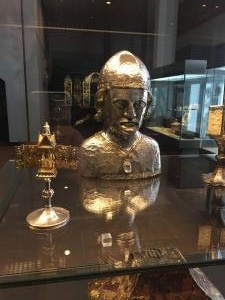We reported last week on the outrage over the decision by Germany and the Stiftung Preussischer Kulturbesitz (SPK) to argue in their motion to dismiss my clients’ claims to the Welfenschatz that a commercial interaction between German Jews and a cabal instigated by Hermann Goering in 1935 “predated the Holocaust by several years.” As we noted last week, the suggestion that the Holocaust was a distant possibility in 1935 was an indefensible statement, factually, historically, and ethically. The initial reaction was swift and severe. As Germany gets ready to host the First Conference of the German Centre for Cultural Property Losses next week, its policies are hurtling in the wrong direction.
Widespread Criticism Continues from Historians Over Germany’s and SPK’s Revisionism Concerning Holocaust and Forced Sales of Art
Topics: Jewish Week Mel Urbach, Hermann Goering First Conference of the German Cen, Gesetz zur Wiederherstellung des Berufsbeamtentums, Henning Kahmann, Atlanta, Simon Wiesenthal Center, Varda Neumann Federal Administrative Court, Yale University, Marion Kaplan, New York University, Germany, Nazi-looted art, Hitler, Kristallnacht Rabbi Abraham Cooper, Deborah Lipstadt, U.S. Holocaust Memorial Museum, Markus Stoetzel, Emory University, Behrens, Holocaust, Bloodlands, SPK, Advisory Commission, Black Earth: The Holocaust as History and Warning, Stiftung Preussischer Kulturbesitz, Restitution, Los Angeles, World War II, Law for the Restoration of the Professional Civil, Washington, Raubkunst, Timothy Snyder, Welfenschatz
Immunity from Seizure in Focus—Loans from Cuba for Exhibitions on Hold
A recent story in The Art Newspaper spotlights a number of lingering issues related to stolen art, the power of U.S. courts to seize property to satisfy liability, and the role of the Immunity from Seizure Act, 22 U.S.C. § 2459 (IFSA). As we discussed recently, the prospect of a material change in U.S.-Cuba relations, which as a commercial matter haven’t existed for more than 50 years, has broad implications for the art market. Just as importantly, there are many, many unanswered questions about the fate of property in Cuba that changed hands or was nationalized as part of the Cuban Revolution in the late 1950s and onward. Simply put, there are thousands of claims worth billions of dollars for all sorts of property that exiles left behind or had taken from them. While it is still a long way off, one impact of potentially normalized relations is the prospect of sorting through those claims.
Topics: Legislation, Malevich, Atlanta, Boston College Law School, The Art Newspaper, Immunity from Seizure, Foreign Sovereign Immunities Act, Wifredo Lam: Imagining New Worlds, 22 U.S.C. § 2459, City of Amsterdam, High Museum, McMullen Museum at Boston College, IFSA, Foreign Sovereign Immunities, Portrait of Wally, Immunity from Seizure Act, Museums, Chabad, Foreign Cultural Exchange Jurisdictional Immunity, State Department, Cuba



